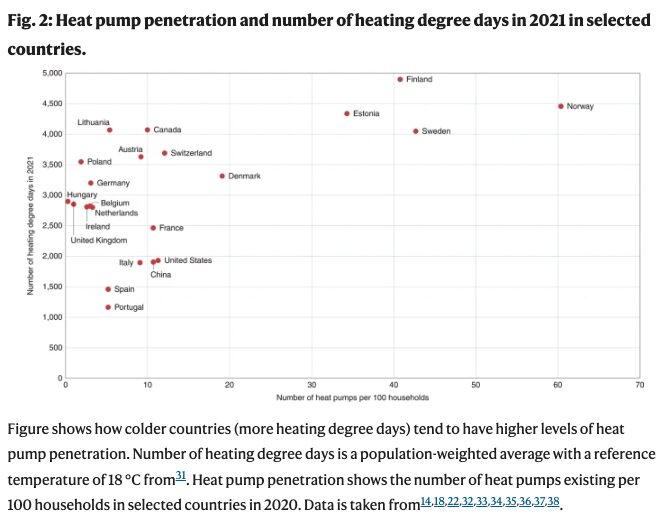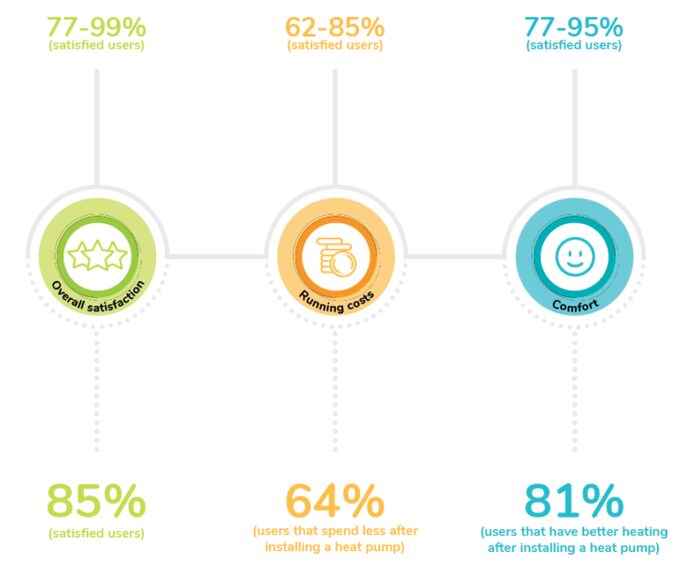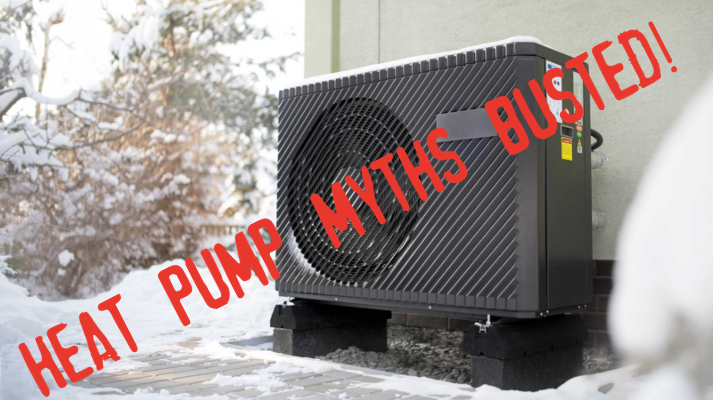Heat pumps are becoming increasingly popular as an alternative source of heating for many households. There are, however, many misconceptions and myths circulating about heat pumps, which are frequently shared on social media and in newspapers. In this article, we address these misconceptions one by one.
Myth 1: “Heat pumps don’t work in cold climates.”
False. The most heat pumps can be found in the coldest climates. More than half of all households in Norway have one as our research shows.

https://www.nature.com/articles/s41560-022-01104-8
Myth 2: “Heat pumps don’t perform when it’s cold.”
Mainly false. Even at temperatures below freezing heat pumps still perform well as field data shows. For very cold temperatures well below freezing hybrid systems may be needed. A great Twitter thread with lots of resources here: https://twitter.com/duncanmgibb/status/1630945862674153472
Myth 3: “Heat pumps don’t work in existing buildings.”
False. From long-standing research: “The research results clearly show that heat pumps as heating source function reliably also in existing buildings. As a rule, the units worked flawlessly.” https://blog.innovation4e.de/en/2021/03/03/how-well-do-heat-pumps-really-work-in-existing-buildings/
Myth 4: “Heat pumps don’t work in old buildings.”
False. Recent results from the UK indicate that there is no significant variation in performance based on house age. I also had a heat pump in my home built in 1880 since 2019 performing very well.
https://es.catapult.org.uk/news/heat-pumps-shown-to-be-three-times-more-efficient-than-gas-boilers/
Myth 5: “Heat pumps cost more to run & increase heating bills.”
This depends on energy prices in your country. The IEA produced a handy interactive calculation tool that allows you to explore & compare economics of different residential heating systems. https://www.iea.org/data-and-statistics/data-tools/residential-heat-economics-calculator
Myth 6: “A heat pump needs to stay on all the time.”
You never switch the heat pump off manually but this does not mean the heat pump is operating all the time. The system automatically adjusts to outside and indoor temperatures and ramps down when it is warmer.
Myth 7: “Heat pumps work with underfloor heating only.”
Heat pumps work well with radiators too. In some cases radiators may need upgrading. But it has been common practise in recent years for heating installers to ‘oversize’ radiators. https://www.sciencedirect.com/science/article/pii/S0360544221032011
Myth 8: “Heat pumps won’t keep you warm.”
Most households who installed a heat pump report that they are as comfortable or more comfortable than before the installation in survey by Coolproducts EU 81% have seen the level of comfort improve.

Myth 9: “Heat pumps are noisy.”
Ground source heat pumps make very little noise. Air source heat pumps can be quiet too as this video shows. Also remember: in the summer when you’re out in the garden heat pumps usually don’t run as no heating required. https://www.youtube.com/watch?v=GKDF5a47eJk&ab_channel=DoreWoodman
Myth 10: “Heat pumps only work in highly insulated buildings.”
False. Research says:
“Houses do not have to be extensively renovated in order to allow for an installation of a heat pump.” https://blog.innovation4e.de/en/2021/02/24/does-a-house-have-to-be-renovated-first-in-order-to-install-a-heat-pump/
But good fabric efficiency offers energy system benefits and keep costs down.
Myth 11: “Turning gas to electricity to heat via a heat pump is less efficient than burning gas in a boiler.”
False. At SCOP 3 a heat pump even if running 100% on gas electricity needs ~1/3 less gas to make the same amount of heat than a boiler. Heat pumps reduce gas even if they use electricity from 100% gas. Professor Sir David MacKay said this already in 2008:
“Heat pumps are superior in efficiency to condensing boilers, even if the heat pumps are powered by electricity from a power station burning natural gas.” https://www.withouthotair.com/c21/page_151.shtml
Myth 12: “Heat pumps devalue properties.”
False. The evidence suggests the opposite. Heat pumps increase the value of properties. “Residences with an air source heat pump enjoy a 4.3–7.1% (or US$10,400–17,000) price premium on average.” https://www.nature.com/articles/s41560-020-00706-4
Research by Savills shows that homes with heat pumps demand a premium compared to regional averages. https://www.savills.co.uk/insight-and-opinion/savills-news/327804-0/buyers-paying-significantly-more-for-homes-with-low-carbon-technology–as-energy-prices-rise
Myth 13: “Heat pumps are unaffordable.”
Partially true. But many countries offer subsidies for heat pumps & with running costs included heat pumps can offer lifetime savings over fossil fuel systems. But it depends on the country. Some examples in this report by the Regulatory Assistance Project (RAP): https://www.raponline.org/knowledge-center/taking-burn-out-of-heating-low-income-households/
Myth 14: “The grid cannot cope with heat pumps.”
Partially true. In many places there is capacity in the grid to supply electricity for more heat pumps. But with significant heat pump uptake electricity demand will grow and grid investment is needed. https://www.euractiv.com/section/energy/news/industry-european-electricity-grid-can-handle-50-million-heat-pumps/
Myth 15: “Heat pumps are the only low carbon solution for heating.”
False. Better fabric efficiency and district heating are very important too and can offer large system benefits in terms of flexibility and system benefits as our research shows: https://www.raponline.org/knowledge-center/heating-without-hot-air-principles-smart-heat-electrification/
Myth 16: “Heat pumps cannot be installed in small apartments.”
False. There are projects where tower blocks use ground source heat pumps for example from Kensa Heat Pumps. And large heat pumps can fuel district heating networks connecting apartments. https://www.kensacontracting.com/heating-highrise/
Myth 17: “Heat pumps will just run on fossil fuel electricity.”
False. It is true that most power grids still include a lot of fossil generation. But every year substantial amounts of renewables are added to the grid driving out fossil generation. https://www.energymonitor.ai/tech/electrification/electrification-using-more-to-emit-less/
Myth 18: “You will freeze during a power cut and be better off with a gas boiler.”
It is true that during a power cut heat pumps cannot function. But the same is the case for a gas boiler. https://mcrgas.co.uk/how-a-power-cut-affects-your-boiler/#:~:text=Both%20boiler%20and%20gas%20central%20heating%20systems%20require%20electricity%20to%20become%20functional
Myth 19: “There is no consumer demand for heat pumps.”
False. 2022 saw record growth in heat pump sales in Europe as our piece in Carbon Brief shows and in the US for the first time more than 4m heat pumps were sold surpassing gas furnaces for the first time. https://www.carbonbrief.org/guest-post-how-the-energy-crisis-is-boosting-heat-pumps-in-europe/


